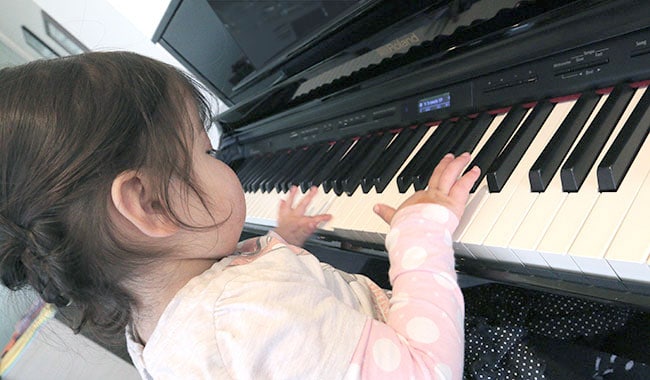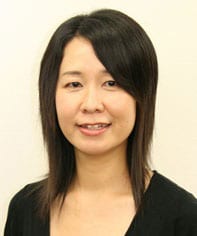Recently, we asked Yumi Sasada the question, ‘ What age can a child start piano lessons? ‘. As an experienced trainer of piano teachers and the owner of a piano school, Ms Sasada explained that every child is different and that there are several determining factors to be considered.
Contributed by Yumi Sasada for the Roland Japan Blog
Related Article: How to Find the Right Piano Teacher
What age can a child start piano lessons?
There is no clear-cut rule for how old your child should be before beginning piano lessons. That said, it is true that the starting age has been coming down. This is not just for piano lessons, but for many other learning activities. The key is to determine how well these learning activities match up with your child’s physical and brain development.
Modern pianos that adults can play comfortably are huge from the perspective of young children. Violins come in child sizes, but not pianos. Piano keyboards are big and heavy for young children. They can place considerable pressure on their fingers. On top of that, piano playing engages your whole body, not just your fingers. Some say that children’s bone structures only begin to stabilise at around the age of six.
Sometimes, children are drawn to the piano at a young age and are able to play it well. Some children may start when they are not physically ready and have a hard time playing well. The student will also need the concentration to sit still when facing the keyboard. This is another aspect that will be different from one child to another.
By any measure, it is not too late to start piano lessons at primary school age. This is when your child’s physical and neural functions are more in balance. There are actually many children who start in their lower primary school years and go on to become excellent players. I think the important thing is to start at an age that is appropriate for your child.
What are some of the important things to keep in mind for very young children?
Many children begin taking piano lessons at kindergarten age and some begin even earlier! Faculties that develop by leaps and bounds when a child is still very young include hearing, memory, judgment, recognition and thinking ability.
In other words, even if they are not physically mature enough to play the piano, these years can be a time in their life when they can nurture the basics of their musical awareness. This is essential for them to express themselves musically. It also helps to strengthen their sensibilities and sense of time, as well as their ability to listen to sounds and to sing.

For this reason, activities such as eurhythmics and dancing are great when children are still young. They will be moving their bodies to experience rhythm and music. This forms the basis for more expressive activities later on.
In our piano classes for younger children, we are moving towards more balanced and age-appropriate methods of instruction. Our emphasis is more on learning rhythm, notation, singing and ear training than on actually playing an instrument. And we also make sure that what the children do play, they can play with their small hands.
During your child’s early years, it would be great to make singing, dancing, storytelling and drawing pictures together a part of your everyday lives. This is also a very precious period of time in their lives, when they can hone their sensibilities through exposure to beauty and through experiences that nurture and enliven their hearts. My belief is that having music and a piano in their daily lives is one element that can have a significant impact on their development.
The best age for a child to learn piano
The best way to find out whether your child is disposed towards music lessons is to observe them first. The most critical factor in deciding when your child should begin lessons is observing the changes that you see in them!
For example, if your child responds to music coming from the TV or in your car by singing along, moving their body, or becoming enthralled in dancing to it, it would be safe to say that your child is ready to take lessons. Some children may love moving their bodies but may not be interested in music. So, a prerequisite would be that your child likes music!
Children often learn to play the xylophone in kindergarten and move on to the recorder later. If they enjoy playing it at home, or hear songs that they have not learned at kindergarten and then go and learn those songs on their own by ear, they may have a gift for music! Children like these are likely to do well.
There are other signs as well, such as if your child’s sibling or friend is already taking lessons and your child tries to mimic what they are doing. Or, perhaps your child will show signs that they want their siblings or friends to teach them.
So, please keep an eye on whether your child is responding to music and take note of these small signs to help you decide when to start their piano lessons.
About the author
 Yumi Sasada
Yumi Sasada
Graduated from the Kunitachi College of Music (Department of Music Cultures & Education, Faculty of Music Studies). Studied piano with Yoshiko Koizumi and vocal training with Emiko Akiyama. While still in school, she became a demonstrator for Roland. After graduation, she taught music at a high school and then became a teacher of classical and popular piano for junior teachers.
She is currently director of the MUSIC OASIS VERDE school at her home. In addition to giving lessons and writing on this topic, she is also actively engaged in developing pre-school learning materials, course co-ordination and giving instructive seminars in many parts of the country. She is also featured as a live DJ at a community FM station and involved with program planning and production, as well as serving as navigator in musical events.
Related Articles
THE PARENTS GUIDE FOR KIDS STARTING TO LEARN PIANO
HOW TO FIND THE RIGHT PIANO TEACHER
5 TOP TIPS ON PIANO LESSONS FOR KIDS
THINGS YOU NEED TO KNOW BEFORE YOU GO TO A PIANO SHOP
For more articles like this
